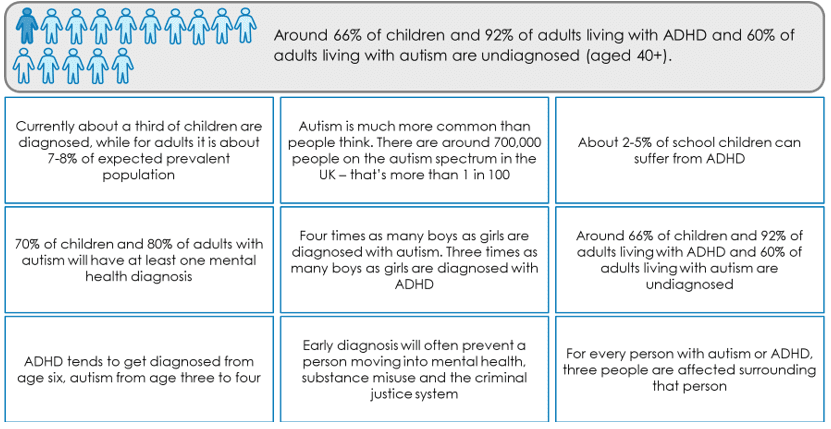Working together to design new neurodiversity services
Transforming Care is a nationally driven programme to improve health and care services so that more people with a learning disability or autism can live in the community, with the right support, and close to home. Alongside this initiative, there are an increasingly large number of health and care systems focusing on developing tailored support and services for those with neurodevelopmental conditions – most notably, autism and ADHD.
Over the past two years, Attain has worked with a number of systems, mental health trusts, local authorities and third sector partners across the country to review the demand and capacity of autism and ADHD services and lead the development of innovative neurodiversity service models to better meet the needs of people with these conditions.
What is neurodiversity?
The term ‘neurodiversity’ refers to the range of innate variations in human temperament, ‘hard-wired’ into every human brain, subtly or profoundly affecting the development of perceiving, behaving, thinking, feeling and relating to others. It is not a mental health condition. Diagnostic labels include: Attention Deficit Hyperactivity Disorder (ADHD), Autistic Spectrum Disorder (ASD), Global Developmental Delay, Specific Language Impairment, Dyspraxia, Dyslexia, and Temperamental Emotional Dysregulation, but these yes/no categories fail adequately to describe an individual’s unique temperament.
The statistics around autism and ADHD make startling reading…

Our experience in this area…
In each of the areas where Attain has worked, we have used a systematic approach to reviewing the current maturity, quality and sustainability of autism and ADHD services, and support the development of new neurodiversity models of care. Broadly this includes:

Some things to think about…
- In most of the systems we have worked in we have found that there was a significant focus on services for those with autism, but not always a focus on those with ADHD; given the prevalence of ADHD, it is hardly surprising that waiting list are growing. Are you giving both conditions adequate focus?
- We have found that hearing from front line staff, service users and their families has been critical to really understand the services and to create buy-in to new ideas – are you talking and listening to all of your local partners and interested parties?
- Our analysis demonstrated significant system-wide life costs associated with the support provided to those with autism and ADHD – and that the earlier the diagnosis, the less the life costs are likely to be. Are you considering the unit life costs when developing business cases for investment?
- We found that traditional pathways, consisting of referral for ‘specialist assessment’ leading to a diagnosis of a specific ‘disorder’, mean that systems are struggling to cope with the numbers of referrals and leaving service users experiencing long delays. Most importantly – service users and families are puzzled when, at the end of what has often been a long wait for a diagnosis to be made, there is frequently no further clinical input or even support for educational adjustments. Are you focusing on diagnosis, rather than thinking about providing early support and services based on need?
Our offer
If your organisation or system is struggling to plan for and manage increasing demand for autism and ADHD assessments and you are considering what future services could look like, Attain has a track record of supporting multiple partners to co-design and implement new transformational services. Our emphasis is on developing effective services that support early intervention, giving people of all ages and their carers rapid access to appropriate support, rather than focussing purely on diagnosis. Most importantly, we put individuals with autism and ADHD and their needs at the heart of everything we do.
For more information, please contact Su.Gordon-Graham@attain.co.uk
Contact us to discuss your challenges
Get in touch with us to learn more about how we can support you in addressing your challenges.
Complete our simple form and we’ll call you right back, alternatively just email: